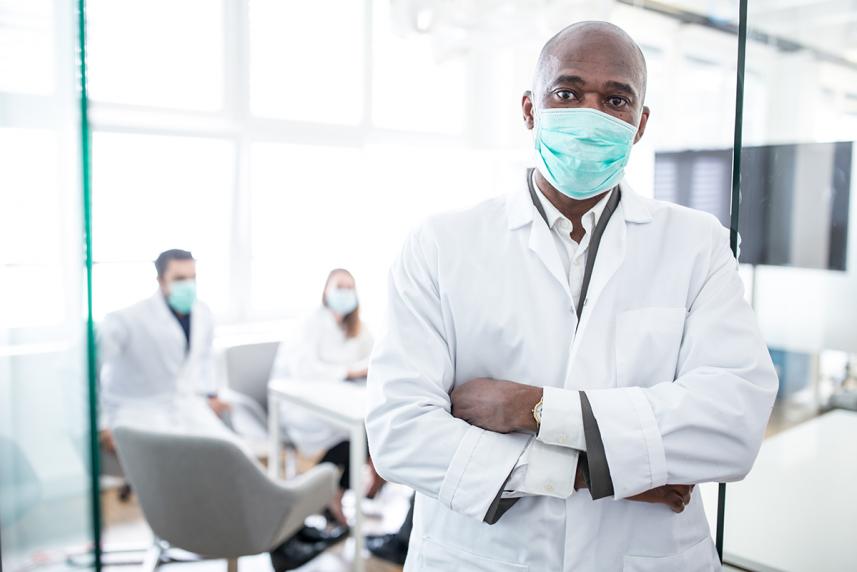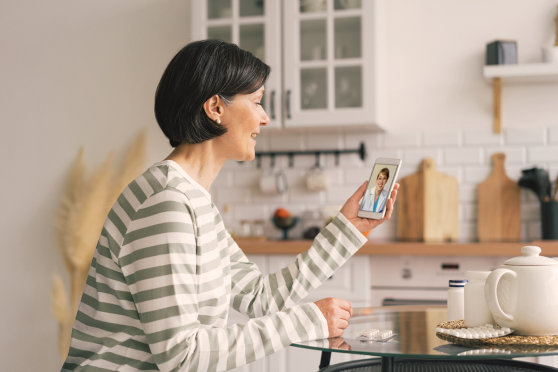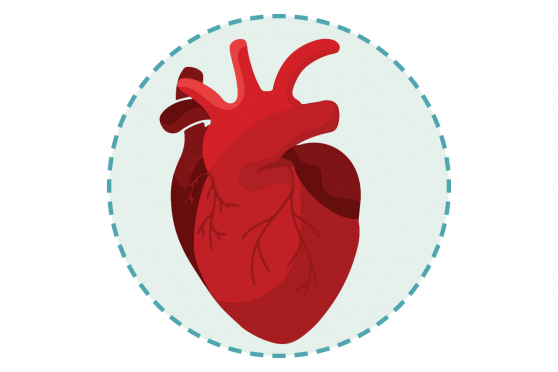Answers to your top questions: the two-dose coronavirus vaccine
How soon after your vaccine will you be protected from COVID-19? What happens if you miss the second dose? A top expert addresses your most pressing vaccine concerns.

The impact of COVID-19 on our lives has affected us all, and the responsibility is ours, as a community, to help beat this virus. Now we have a new, safe, and effective tool to help us — COVID-19 vaccines.
We know you have a lot of questions about COVID-19 vaccines, and we’re here to help you navigate the overflow of information — and misinformation — reported from many sources.
We sat down with a member of the National Vaccine Advisory Committee, Robert Hopkins, M.D., to help understand what you need to know regarding this lifesaving immunization. As a professor of internal medicine, Dr. Hopkins translates complex medical facts into practical advice. See for yourself below.
Q: Why do I need a second dose? What happens if I miss my second appointment?
Dr. Hopkins: The vaccines from Moderna and Pfizer require two doses: The first dose delivers messenger RNA (mRNA) that instructs the immune system to start making antibodies, and the second shot makes that response stronger and longer lasting. You will not receive the reported benefits of the vaccine if you do not get both doses.
Also, the second dose should be given on time, which means 21 days after the first dose for the Pfizer vaccine and 28 days after the first dose for the Moderna vaccine. The Centers for Disease Control and Prevention (CDC) recommends giving the second dose within four days of that interval; but if you’re late, just schedule it as soon as possible. The concern with being very late on your second dose is that the protective benefits of the vaccine may be reduced.
Q: Once I get the shot, how soon will I be protected—and for how long?
Dr. Hopkins: You will likely develop some degree of protection within a couple of weeks of getting the first dose of the vaccine. But the high degree of protection reported in clinical trials is not fully developed until about two weeks after the second dose. We don’t know yet how long that protection will last. What has been evaluated so far in trials is that levels of antibodies appear to be higher in people who’ve been vaccinated than in people who had severe coronavirus disease. So, that’s a good indicator that the vaccine is going to provide a “durable” protection. We will continue to learn more about the vaccines’ effectiveness over time.
Q: What side effects should I expect from my COVID-19 vaccine?
Dr. Hopkins: When people experience side effects, they’re usually mild to moderate and go away in a few days. You might feel pain or swelling on your arm where you got the injection. You could also experience fever, chills, tiredness, or a headache. Some people report feeling these side effects more after their second dose of the vaccine, but those will also last just a day or two. If you experience anything beyond that, reach out to your doctor. And remember, you cannot get COVID-19 from getting the shot. There’s no live virus in the vaccine.
Q: What if I already had COVID-19? Do I still need to get the shot?
Dr. Hopkins: Yes. The immunity you get from the vaccine appears to be stronger than what you have if you were infected with the virus.
In people who had COVID-19, the level of immunity that develops and how long it lasts is still unknown, but it appears to be at least 90 days. For this reason, many experts recommend that you wait 90 days after being infected to receive the vaccine. Doing so could give you a longer period of immunity.
People who have received monoclonal antibodies or convalescent plasma should also wait about 90 days after the treatment so the antibodies they were given do not interfere with the vaccine-related immune response.
Q: Who is eligible to get the vaccine?
Dr. Hopkins: The vaccine is being rolled out in phases based on factors including age, health status, occupation, and potential exposure to the virus. For example, health care workers, long-term care residents, and first responders were among the first to be eligible to receive the shot. The CDC makes recommendations for who should get the vaccine first, then each state makes its own plan. To learn eligibility based on each state, visit COVID-19 Vaccines
Q: Who’s qualified to give me the vaccine?
Dr. Hopkins: Any health care provider who has been trained in vaccine administration (that is, how to give a shot safely) is qualified to give you the immunization. The greatest challenge at present is having enough vaccine and vaccine sites to meet the needs of all who want the vaccine. Many vaccine sites will be staffed by physicians, pharmacists, nurses, physician assistants, medical assistants, and students of various health professions.
Q: Is it OK to get my second shot in a different location than my first?
Dr. Hopkins: You will most likely get an appointment for your second shot at the same location after completing your first shot. If, for some reason, you are unable to keep that appointment it is OK to get that second shot in a different place. Just remember to bring your vaccination documentation card that you received after your first shot.
Q: Are the Moderna and Pfizer vaccines interchangeable? Do I have to get the same brand for both doses of the vaccine?
Dr. Hopkins: The Moderna and Pfizer vaccines are not interchangeable. They haven’t been studied when used in combination. And though the CDC recently authorized mixing brands of vaccine in certain rare situations, you are strongly advised to get the same brand of shot for both doses. Bring your vaccination documentation to your second appointment to avoid any mix-ups.
Q: How much will it cost? Or can I get it for free?
Dr. Hopkins: The COVID-19 vaccines will be free for everyone in the U.S.
- The Federal government is currently covering the cost of the COVID‑19 vaccine itself. Your insurance will cover and waive all commercial members’ cost-sharing (such as copays, deductibles, and coinsurance) for its administration.
Q: Do I still have to wear a mask after I get the COVID-19 vaccine?
Dr. Hopkins: We absolutely need to continue to mask, social distance, wash hands, and avoid crowds following vaccination. I think of vaccines as an additional layer of protection. These public health measures are particularly important in winter, when we are more likely to be indoors with others, which can increase the risk of transmission. Remember that the vaccines are about 95 percent effective, meaning there’s still a very slight chance that some vaccinated people will get the virus. People who have been vaccinated have a small chance of carrying the virus and infecting nonvaccinated people.
We cannot drop our defenses until we have enough people vaccinated for us to develop community immunity, which may be 70 to 75 percent of the population.
Taking all these steps plus vaccinating is what will allow us to get back to (what we used to call) normal, so we can enjoy our favorite activities once again.
DISCLAIMER:
The information in this story is accurate as of press time and posting [insert date]. Because the situation surrounding COVID-19 continues to evolve, we encourage readers to follow the news and recommendations for their own communities by using the resources from the CDC, WHO, and their local public health department.


